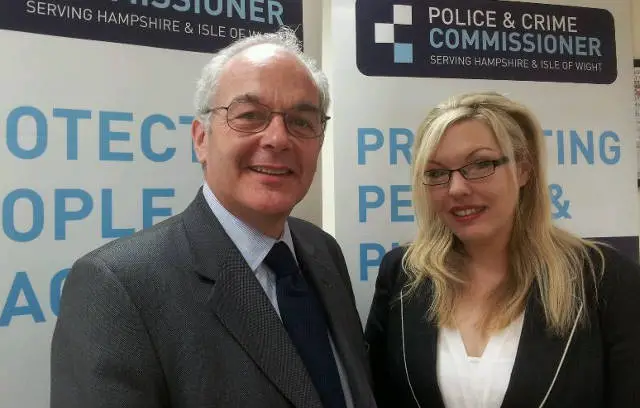OnTheWight had the opportunity to meet and interview the new Assistant Police Commissioner, Laura Franklin today along with Simon Hayes, the Police and Crime Commissioner.
We thought it would be useful to readers for Simon and Laura to briefly explain how they see their roles and the relationship they have with the Island.
The role of Police Commissioner
Simon explained that after being elected to the role last year, he now has budget responsibility for the entire Hampshire and Isle of Wight police service.
As well as challenging and monitoring the work of the police Constabulary, he’s also responsible for setting the strategic targets for the roles the police have (although it’s worth noting that he has no operational responsibility).
Full details of his vision for the police service can be found in the Police and Crime Plan which was published in March 2013.
The role of Assistant Commissioner
Laura tells OnTheWight she sees her role as two-fold. Firstly engaging with the public, carrying out consultation and canvassing opinion by inviting individuals and groups to attend meetings, as well as herself attending community events.
The second part of Laura’s role will be to liaise with the Commissioner, Simon Hayes, developing ideas and initiatives that will help improve policing on the Island.
Laura believes that by being involved as she has been (see her background) – and will be in the new role – that she can help make a tangible difference. A view backed up by Simon Hayes who said she was “uniquely qualified” to represent him on the Island.
Why an Island representative?
As pledged during the election for PCC, Simon Hayes said he would be looking for a representative on the Island because of its uniqueness and challenges that other parts of the Constabulary don’t have.
Laura has served as a Special Constable on the Island and lived here for 25 years, so is well placed to take on the role.
Simon made it clear that having Laura here as his assistant does not mean he’ll be making less visits to the Island, but simply increasing his reach.
Your questions answered
We put out a Tweet and call on Facebook this morning, asking readers whether they had any burning questions they’d like answered by the PCC.
Expensive vehicle fleet
Thomas Cowley raised the issue of the cost of police vehicles, specifically BMW X5s being used as opposed to more cost effective 4X4 models.
We put the question to Simon Hayes, who confirmed that they are currently looking at the type and cost of vehicles, adding that the police service benefits from reduced pricing due to bulk buying so they do not pay the same price as members of the public.
Tackling domestic violence
Another subject we’d been asked to highlight is the hidden crime of domestic violence. Kim Brown was keen to know their thoughts on domestic abuse and how it’s addressed on the Island.
Simon Hayes acknowledged that the figures for the Island are quite high and action needed to be taken, confirming the issue of domestic violence is included in his Policing Plan.
He told OnTheWight that he’s keen to not only prevent re-offending, but also offending in the first place.
Rather shockingly he gave the example that a woman (which it is most often) may be attacked 15-18 times before going to the police.
He hoped that police would be able to bring perpetrators to justice, as well as looking at ways to educate and rehabilitate to prevent re-offending.
Rural crime
Laura explained that one area she’d be looking for specific feedback on is rural crime and how it affects Island residents.
She is keen to speak to groups to find out more about how fox hunting; fuel thefts; harm of animals etc impacts Islanders’ lives.
Tackling offenders
With Laura’s indepth knowledge of Criminology, we asked her to share her view on how to tackle offending and re-offending.
Acknowledging that it is difficult to generalise, Laura said she felt that prison wasn’t the best answer for low level offences.
Tackling low aspirations
She feels that it’s important to raise aspirations of young people on the Island and letting them know that they can achieve them, citing the 2012 Children’s Society study. The study found that at the age of five, children on the Island had the same aspirations as five year olds in other parts of the country, but by the time they reached 14-15 years old, they start to believe that they can’t achieve those aspirations.
Listen to the discussion by clicking on the play button below Audio Player




